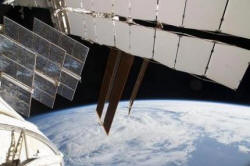|
 Cosmonauts
breeze through spacewalk outside space station Cosmonauts
breeze through spacewalk outside space station
 Send a link to a friend
Send a link to a friend
[October 23, 2014]
By Irene Klotz
(Reuters) - Two Russian cosmonauts wrapped
up a speedy, 3 -1/2-hour spacewalk outside the International Space
Station on Wednesday to replace science experiments and jettison two
unneeded antennas.
|
|
 Station commander Maxim Suraev and flight engineer Alexander
Samokutyaev quickly completed the first task on their to-do list,
removing and jettisoning a defunct science experiment known as
Radiometriya. The device, which was installed in 2011, was used to
track seismic activity on earth, NASA mission commentator Rob Navias
said during a live broadcast of the spacewalk on NASA TV. Station commander Maxim Suraev and flight engineer Alexander
Samokutyaev quickly completed the first task on their to-do list,
removing and jettisoning a defunct science experiment known as
Radiometriya. The device, which was installed in 2011, was used to
track seismic activity on earth, NASA mission commentator Rob Navias
said during a live broadcast of the spacewalk on NASA TV.
Suraev and Samokutyaev then removed a protective cover from a
European science experiment that exposes seeds, bacteria spores,
fungi, ferns and other samples to the harsh environment of space.

The cosmonauts, both making their second spacewalks, cut cables,
removed bolts and tossed away two obsolete antennas from the Poisk
mini-research module. The antennas, used to guide visiting
spacecraft to docking ports, will remain in orbit for up to a year
before Earth’s gravity tugs them back into the atmosphere, where
they will incinerate.
Suraev and Samokutyaev also took samples from a window and
photographed the outside of the Russian part of the station for an
engineering analysis.
The spacewalk, originally planned for six hours, was finished in 3
hours and 38 minutes. The cosmonauts left the station’s Pirs module
at 9:28 a.m. EDT as the complex sailed 260 miles (418 km) above the
planet.
[to top of second column] |

“Everything was very well done,” an interpreter for the Russian
Mission Control Center outside Moscow said during the broadcast.
The spacewalk was the third in three weeks and the seventh and last
outing planned for this year. Next year, NASA plans up to 10
spacewalks to reconfigure the station for the arrival of commercial
space taxis, which are expected to begin flying crews to the outpost
in 2017.
The station is a $100 billion research laboratory owned and operated
by a partnership of 15 nations.
(Reporting by Irene Klotz in New York; Editing by Grant McCool)
[© 2014 Thomson Reuters. All rights
reserved.] Copyright 2014 Reuters. All rights reserved. This material may not be published,
broadcast, rewritten or redistributed.

 |